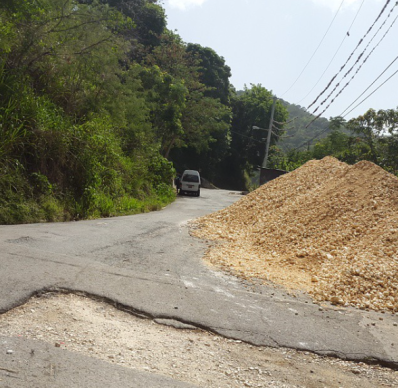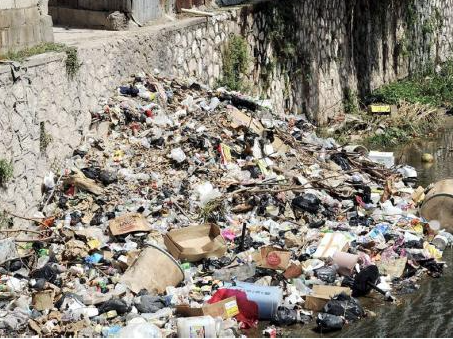From where I sit, Jamaica is a true ‘pothole’ society: it seems to rarely fix underlying problems, which then soon resurface after attempts at patching over them. It’s a classic form of failure that needs deep analysis on many levels because it requires a high degree of compliance from all levels of society. There’s little point our complaining about the consequences of this phenomenon, because we have been major contributors in its creation and duration. I’m not going to try to much analysis, yet. I first want to make sure that I have seen and understood the many examples of the ‘potholing’.
In thinking about the analogy, it’s helpful to see what a severe hole in the road can do. We got that clearly just a week ago, when a part of a major traffic route collapsed, with sewer mains damage. It caused havoc for the travelling public, as the extensive video below shows:
What causes the ‘potholes’ may differ, but the consequences are a series of clear costs to those who have deal with them, and costs passed on to others, as a result. It’s a series of ripples. With the problems on Constant Spring Road forcing traffic to find alternative routes, much of the central area of the capital suffered heavier flows and traffic jams. People did not know the best alternatives, so guessed and changed trying to find the best ad hoc solution.
So, too, with the pothole society: people develop coping mechanisms. The picture below shows a familiar sight. Damaged road awaiting repair, and some material ready, in place. A few days later, a crew may/will come to lay the marl, beat it down, then place a layer of tarmac over the repair. Inevitably, however, after a series of heavy rains (and during hurricane season, as now, that can be in a day), the damage resurfaces. The process restarts…

What is behind this seemingly short-sighted approach? Well, politics, for one. Simple economics, for another. Ineptitude and ignorance? Maybe, but less likely.
Politics plays out in several ways: getting resources; being seen to ‘tackle’ problems; distributing contracts/work/improvement.
Economics features in its way. Beneficiaries, obviously, are better off–money in hands and pockets to spend will trickle around and give a ‘better’ living for a while. Activities are helped by being able to resume or expand now that the road has been repaired; customers can be satisfied.
The road repair analogy is the bigger society on display. Politicians get more ‘bang for their buck’ as elected representatives if they can be seen as ‘fixers’; it’s almost like having permanent adverts displaying about the ‘good’ that is being done. Many MPs are judged by their ‘doing’ and gladly take credit for work done by other agents. But, it also means that the MPs’ livelihood is tied to never fixing the problem completely. Sadly, this focus on ‘fixing’ ‘potholes’ means that little regard is given to the fact that the road may acutally have fundamental problems that mean it must worsen with use.
Look at the country more widely. Repainting a rusty bridge gives it a good gloss 🙂 but it may still be structurally unsound and soon due to fall. Giving people ‘jobs’ like bushing and painting lines let’s them have some cash in their pockets, but the bushes grow back and the lines get worn out. The worker, often with few attributes to compete and hold down a range of jobs, depends on such ‘make good’ work. He or she would be better off if better trained or educated. Instead, handouts have to be the legal way to get paid. The illegal options are clear.
More broadly, still, we see the ‘potholing’ in that statistic the debt/GDP ratio. This is the epitome of spending on fixes and doing little to change or build a solidly underpinned economy. Borrowed money has been badly invested (taking account of the fact that some of the funds never went to purposes, at all, but to people who did nothing in return). In other words, individuals have gained at the expense of the wider society. One need not know the names of those individuals, one can deduce a good number of them through some simple ‘lifestyle’ analysis.
I’ve often talked about ‘rent-seeking’ behaviour, and the ‘potholing’ in the general economy is seeing it at work.
But, the ‘potholes’ exist in many sectors and are shown by the emergence of problems that have existed and been known for years, but never dealt with. At its worst, the ‘managers’ in those settings (public and private sector) have lied, denied, covered up and blamed others for these failings. In a simple term, it’s about lack of compliance and enforcement.
We have seen them recently in the health sector (shoddy hygiene, poor recording of incidents, lack of openness about system failures). We have had incidents, termed ‘dead babies’ scandals, about high incidence of premature infant deaths. But, more widely, we have had the results of unflattering reports into the regional health authorities.
We have seen them in the building sector (when a building collapses the trail of neglect becomes clear, very quickly; think about Royalton Hotel, Negril). The general response is to launch a probe, form a committee, review. The subsequent action?
We have seen them in the process of creating and executing major projects. The botched affair with Krauck and Anchor must be a business degree case study.
We see it in the water sector: infrastructural and distrubutional weaknesses that remain unaddressed but become the cause of concern with each regular drought.
In electricity, the theft of power, often aided and abetted by politicians.
In land and agriculture, the tolerance of squatting and praedial larceny, rather than creating and upholding an orderly system of tenure, or other regulations that impede the selling of stolen produce.
In the environment, where we all live with the consequences of ineffictive waste management couple with poor waste management practices by citizens, both of which help create a lucrative business in ‘clearing up after’, while we live in constant near-squalor in many places. Scenes like this garbage-filled Kingston gully are not new, or intractable, and their consequences are clear and regular.
That’s an extensive array, and it’s not complete.
But, how does one break the cycle of something that benefits so many people?

I have thought about this extensively since I’ve moved here, almost five years now. I have come to the same conclusions as to the cause and from my political science perspective I would suggest another underlying “problem”. In terms of democracy, Jamaica is a young country. Its institutions are immature and thus weak (plus burdened by colonialism and the legacy of slavery but this is a whole other topic), thus they are susceptible to corruption, natural disasters, etc. So add in no incentives to move forward, as you have outlined, and things don’t change. Plus you have so many young men not working, so they are desperate for cash, so they turn to illegal and gang activity, as they find a family and purpose there, which leads to increased crime and violence. That would be my one meagre suggestion: get these guys working, perhaps through public infrastructure programs (with more than a living wage) which you could finance, in part, through public/private partnerships. Not a perfect solution (how do you address self-esteem issues and comportment on the job? Also the private sector is understandably wary of investing in JA) but a start? I believe people want to work and if you get these young men off the streets, integrated into a society they feel disenfranchised from, then it is a start…other than that, it takes time and brave individuals to step up and act for the greater good, rather than cashing in as free riders and taking advantage of corruption…thoughts from a sleep-deprived, new-mother brain…
LikeLiked by 1 person
Thanks, Kate. I’m still thinking, but may draw on your conclusions in my Facebook live chat later today–3:30
LikeLike
Just watched, excellent!
LikeLiked by 1 person
I should add that crime is such an overlooked factor when it comes to prohibiting economic development. It slows EVERYTHING. For example, my husband had a storeroom for his goods in Kingston. It was cleaned out so he keeps it in the country. This is a 1.5 hour drive back and forth. Time wasted. Plus the roads are so atrocious the 1.5 hour drive becomes 2 hours, plus wear and tear on his car. Business is slowed. And imagine this incrementally, all these small business people trying to conduct business but constantly thwarted from advancing to the next level…
LikeLiked by 2 people
Crime is one of the many drags on economic development in Jamaica, and its interconnections are many. It’s a Gordian knot. See my post in August about crime and the corruption of logic.
LikeLiked by 1 person